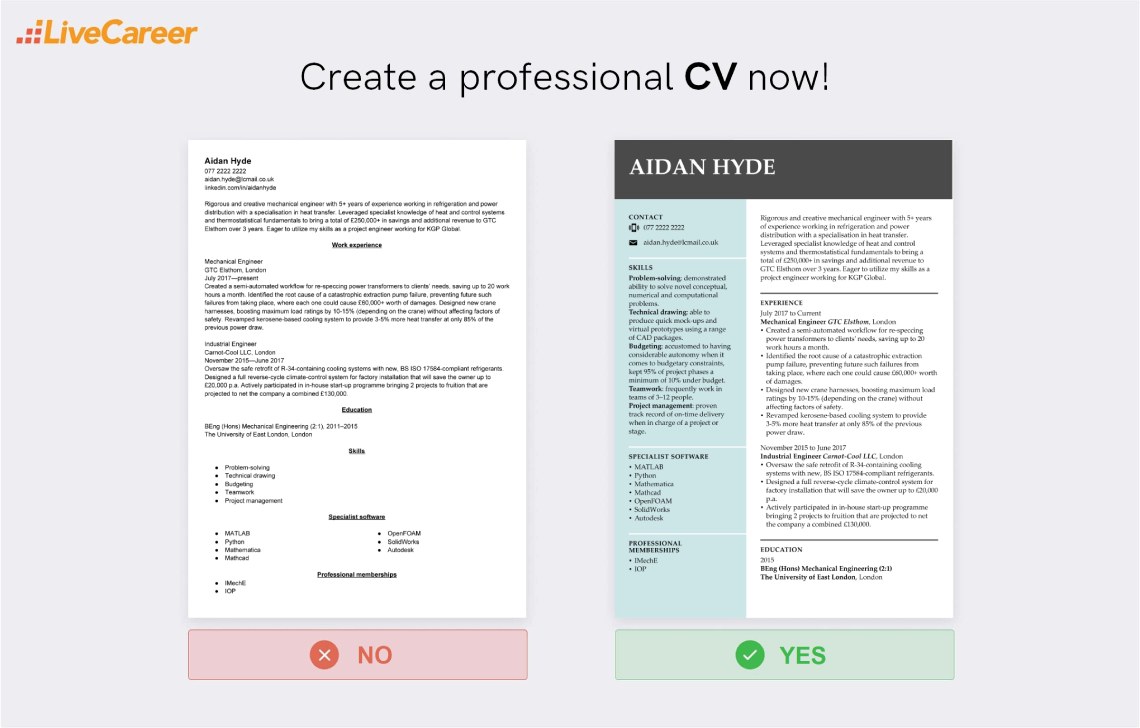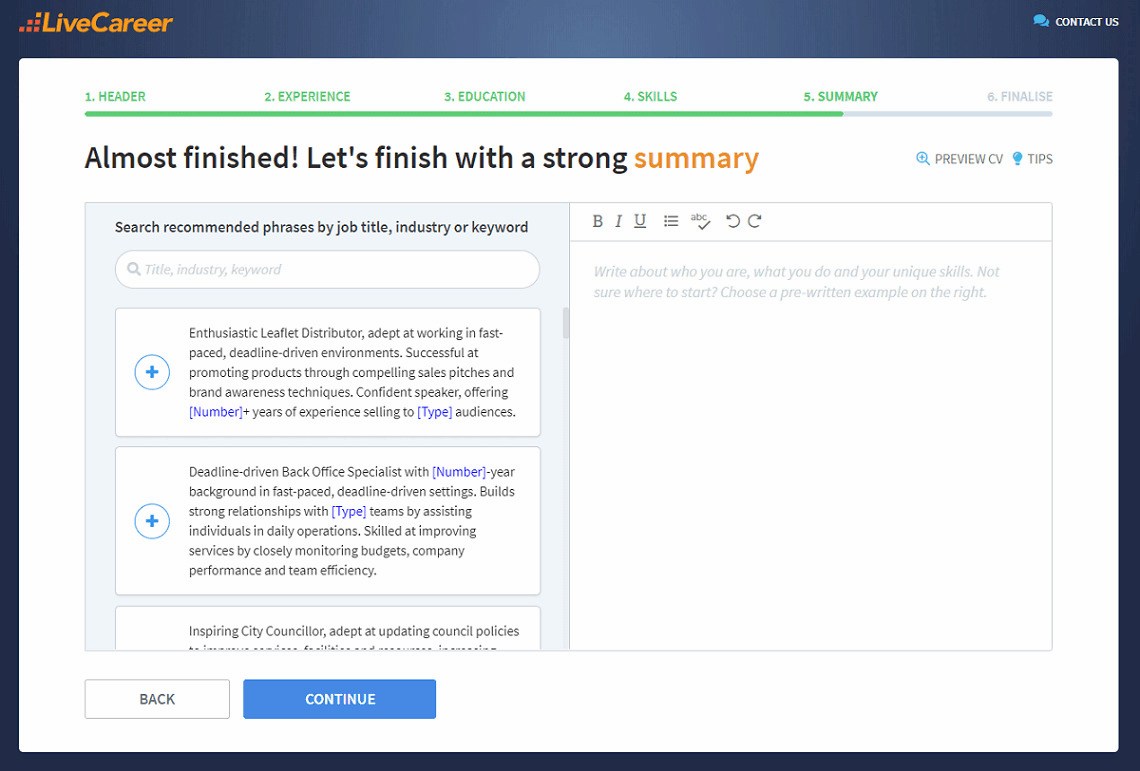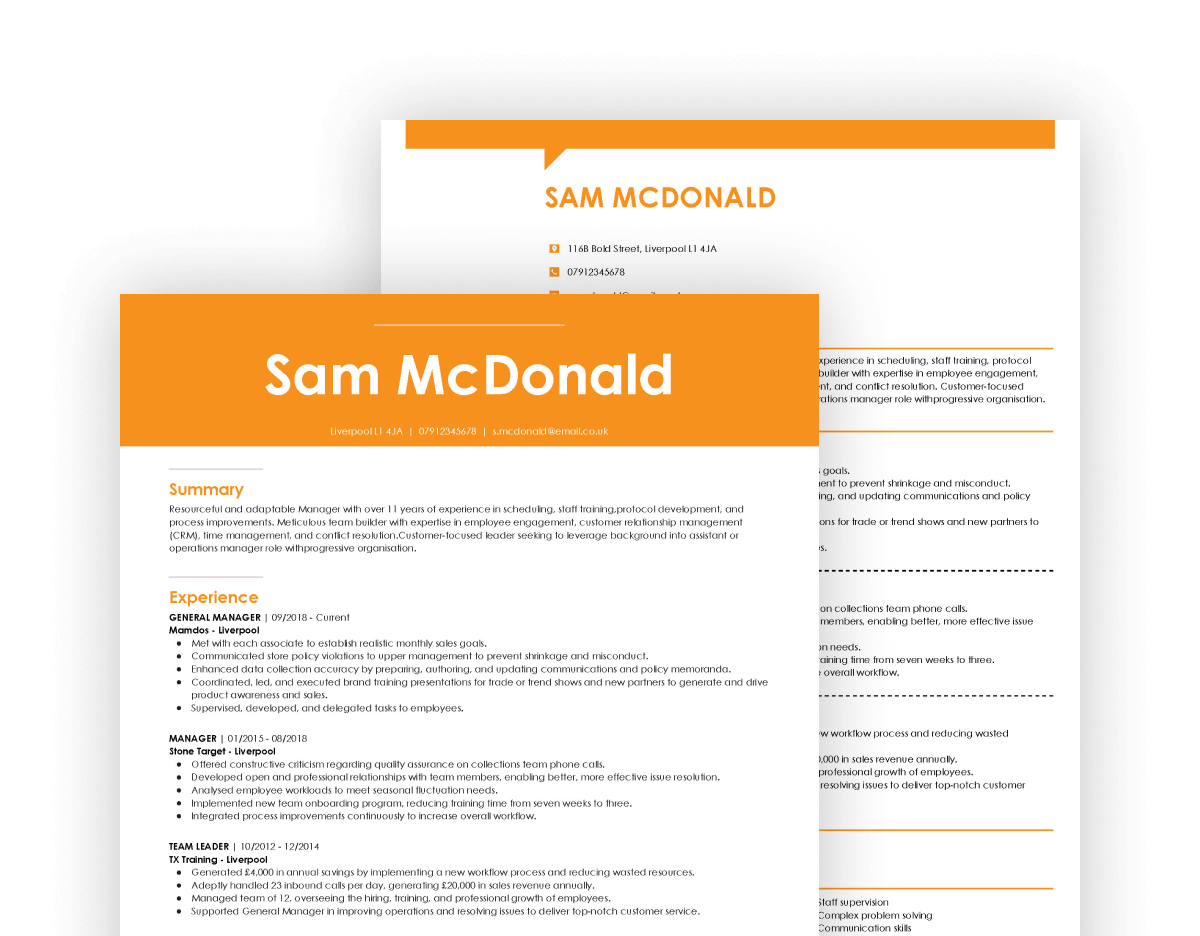Academic CV Template, Example & How to Write It
Writing an academic CV requires a focus on showcasing your academic and professional accomplishments. Here's a step-by-step guide on how to create it to continue your research.
Our customers were hired by:
A hallmark of a good engineer is the way they find their bearings when dropped into the deep end. That’s because so much of what you do as an engineer comes down to know-how rather than just knowledge.
Writing an effective engineering CV is like many engineering problems: there’s more than one right way to do it. This article will help you approach the asymptote that defines maximum effectiveness while optimising for minimal effort. You'll learn how to write the best engineering CV possible, that said.
In this article, you'll get an expert engineering CV that exceeds expectations, engineering CV examples to inspire your own application, and a top-notch engineering CV template you can adapt to your preferences.
Create an effective CV in minutes. Choose a professional CV template and fill in every section of your CV in a flash using ready-made content and expert tips.

We created the sample on the right using our builder. See other good CV examples like this one.
Need a different CV example? Check these samples:
Haven't found what you're looking for? Check all our CV examples.
Based on over 6 million CVs created in our builder, we found out that*:
*The data comes from a period of the last 12 months (August 2023-August 2024).
Aidan Hyde
077 2222 2222
aidan.hyde@lcmail.co.uk
linkedin.com/in/aidanhyde
Rigorous and creative mechanical engineer with 5+ years of experience working in refrigeration and power distribution with a specialisation in heat transfer. Leveraged specialist knowledge of heat and control systems and thermostatistical fundamentals to bring a total of £250,000+ in savings and additional revenue to GTC Elsthom over 3 years. Eager to utilize my skills as a project engineer working for KGP Global.
Work experience
Mechanical Engineer
GTC Elsthom, London
July 2017—present
Industrial Engineer
Carnot-Cool LLC, London
November 2015—June 2017
Education
BEng (Hons) Mechanical Engineering (2:1), 2011–2015
The University of East London, London
Skills
Specialist software
Professional memberships
Now you know what a perfect CV looks like. Here’s how to write your own engineering CV.
There are as many different kinds of engineers as there are ways to fail to solve a third-order PDE. ‘Kind’ refers to your specialisation and experience but also your temperament and passions. It’s not easy to get all that across.
This is, though, exactly what your engineering CV personal statement is there to do. It:
Your CV personal statement should be 3–4 sentences long, about 50–150 words. That’s not very long at all, and this is a good thing because you’ll be writing a new one for every new job application. To make that process easier you can use the following questions to generate content.
It’s probably not news (or at least not a surprise) to you that the job-application sorting process has been automated to various degrees. Many companies now routinely use some form of Applicant Tracking System (ATS) to triage and filter job applications before a recruiter even lays eyes on them.
Make sure your engineering CV makes the cut by:
It’s going to be better and easier if you leave writing your personal statement until last. You’ll be able to do a much better job once you’ve prepared your job descriptions for the work experience section at least (and that's why it's often called a CV summary). So you can safely leave it at the back of your mind for now and come back to it later.
Rigorous and creative mechanical engineer with 5+ years of experience working in refrigeration and power distribution with a specialisation in heat transfer. Leveraged specialist knowledge of heat and control systems and thermostatistical fundamentals to bring a total of £250,000+ in savings and additional revenue to GTC Elsthom over 3 years. Eager to utilize my skills as a project engineer working for KGP Global.
A strong CV summary will convince the recruiter you’re the perfect candidate. Save time and choose a ready-made personal statement written by career experts and adjust it to your needs in the LiveCareer CV builder.

Before going any further, you’ll need to decide on which CV format you want to use. The odds are overwhelming that the best engineering CV format for you is going to be the chronological format. This means that you’ll order your job descriptions in reverse-chronological order.
There are other options such as a skills-based (or functional) CV format or a hybrid (or combination) CV format, but they only apply if you’re changing careers or transitioning to civilian employment after a stint in the military. A chronological format is what recruiters expect and ATSs can parse most easily.
Prepare an outline for your work experience section by using the following template to make a subheading for each previous position. Again, start from your most recent position and work your way back from there.
[Job Title]
[Company Name, Location]
[Dates of Employment]
Populate each job description with up to six bullet points. These bullet points should not be descriptions of your duties and responsibilities. Instead, they should be accounts of your on-the-job achievements. An achievement is a description of the benefits you’ve brought to an employer through your actions.
Achievements are above all else measurable. Use something like a PAR (Problem Action Result) formula to structure your achievements and quantify everything you can—the benefits you brought to your employer first and foremost. You may have to estimate some of these figures, that’s absolutely fine.
If you’ve just graduated and writing an engineering CV with no experience (or writing your first-ever CV), then focus on any summer jobs, placement, and volunteer work you’ve done.
This engineering CV example shows how to prepare a perfect engineering job description:
Mechanical Engineer
GTC Elsthom, London
July 2017—present
Industrial Engineer
Carnot-Cool LLC, London
November 2015—June 2017
Realistically speaking, there aren’t many ways into a career in engineering that don’t involve a relevant degree. Some form of tertiary award in engineering will be something that recruiters will expect to see on your engineering CV. So keep your education section easy to find, clear, and concise.
Use this structure for both university degrees and other tertiary qualifications:
[Degree Type] [Degree Name](Degree Class), [Years Attended]
[Institution Name], [Institution Location]
Include an expected graduation date if you’re still studying. If you lack work experience, then add academic achievements and areas of excellence here and put this CV section above your work experience section. There’s no need to mention your high school education unless you’re writing a student CV.
BEng (Hons) Mechanical Engineering (2:1), 2011–2015
The University of East London, London
“Early in a career, education is significant, but hands-on experience becomes more valuable over time. In the USA, education still holds weight, especially for higher-level positions, but practical skills and real-world experience increasingly outweigh formal education, particularly in fast-paced industries like technology”.
Your work experience and work achievements will certainly hint at many of your engineering skills. You’ll still need to explicitly list your key skills, though. ‘Key skills’ are defined here with respect to what the given company has set out as its requirements and what it might find attractive besides.
Like with many engineering problems, the most efficient route to getting a suitable list of skills involves a bit of a detour and some thinking ahead. Start by making a general master list of engineering skills. Open a new document and begin listing as many of your skills as you possibly can (hard and communication skills).
Now for some destructive testing. Work through your skills list adding a sentence onto each one that describes how you’ve demonstrated that skill in your work. Any skills for which you can’t do this get eliminated from the list. What you’re left with is your skills master list, keep it for future applications.
Go back to the job advert and double check what skills are required there. Copy 5–10 skills from your master list being sure to at least cover what’s required in the advert. Once again, try to mirror the keywords used in the advert by substituting synonyms and/or rephrasing as necessary.
Your education and work experiences can only ever go so far in painting a full picture of you as an engineer. Your life beyond these two spheres so often has a positive impact on your ability to conceptualise, troubleshoot, and design things. Fill in those missing elements by including extra sections in your CV.
You could include sections that elaborate on what specialist software you’re adept at using, or what other awards or accolades you’ve picked up along the way. You could list your professional memberships or any publications to which you can lay claim. Even hobbies can be unbelievably useful on a CV.
The golden rule is that whatever you add must be relevant to the job at hand. Otherwise, it’s at best clutter and a waste of precious space (and that's why it's recommended not to add references to a CV). Some things are always worth mentioning, though, like the ability to speak a foreign language. This is associated with many benefits and could really set you apart.
Specialist software
Professional memberships
There are things in this world that are inextricably linked, like orthogonal E and B waves or senior engineers and moustaches. It’s the same with your engineering CV and cover letter. The two form a single job application. Submitting only a CV is leaving the job half done, unless asked to do so, of course.
If a cover letter is explicitly required or not mentioned at all, then you have to include one to stand a chance. A good engineering cover letter will comprise:
We all know how important a general sense of neatness or clear setting out are when it comes to engineering calculations, presentations, and reports. Attention to detail ranks highly as well. Put all this on display in your engineering CV by keeping the following CV layout rules in mind before hitting ‘send’ on your CV.
Both your engineering CV and cover letter have to be absolutely word-perfect. Engineers aren’t renowned for their written communication skills (fairly or not). It’s not your writing skills that are going to be judged by your spelling and grammar mistakes, though, but your attention to detail and conscientiousness.
Read over your work and then read over it again. Use a spellchecker or app to handle the spelling mistakes and the most egregious grammatical errors. Most importantly of all, get someone else to read over your work. They’re virtually guaranteed to find things you missed, that’s just how it goes.
Follow up with a quick call or email if you haven’t heard back after a week or two. It’s a simple little thing that could make a big difference. If nothing else, you might find out how your application is going.
And... that's it! Now you know what a good CV should look like. Good luck!
You don’t have to be a CV writing expert. In the LiveCareer CV builder you’ll find ready-made content for every industry and position, which you can then add with a single click.

That’s all there is to it! I hope this article has answered any questions you might have had about getting your engineering CV together and making it as effective as possible. Let us know in the comments section below if there’s anything you’d like more information on. And tell us: did you get the job?
Our editorial team has reviewed this article for compliance with Livecareer’s editorial guidelines. It’s to ensure that our expert advice and recommendations are consistent across all our career guides and align with current CV and cover letter writing standards and trends. We’re trusted by over 10 million job seekers, supporting them on their way to finding their dream job. Each article is preceded by research and scrutiny to ensure our content responds to current market trends and demand.
About the author
Since 2013, the LiveCareer UK team has shared the best advice to help you advance your career. Experts from our UK editorial team have written more than one hundred guides on how to write the perfect CV or cover letter.
Rate this article:
Engineering cv
Average:

Writing an academic CV requires a focus on showcasing your academic and professional accomplishments. Here's a step-by-step guide on how to create it to continue your research.
View free Word CV templates in UK format to enhance your job search. Explore user-friendly and professional designs, handpicked to suit various career needs.
Craft a standout production operative CV with our expert writing guide. Get inspired by our production operative CV example and secure your next role.
Our customers were hired by: